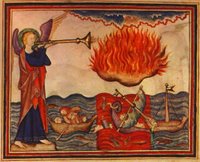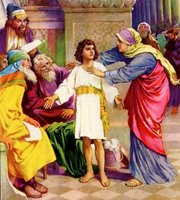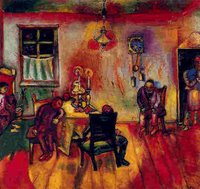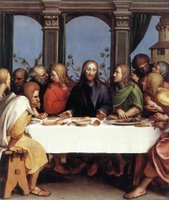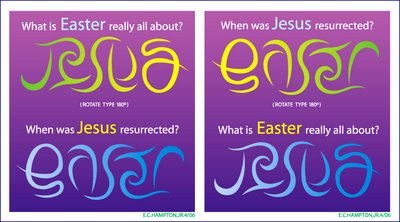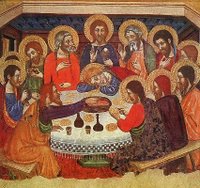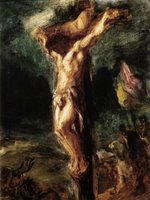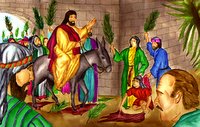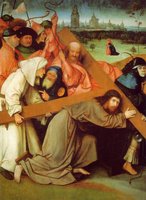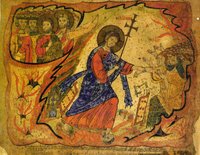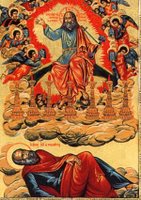Lutheran Carnival-22 Quasimodogeniti
Quasimodogeniti, the Second Sunday of Easter’s “week of weeks” brings the twenty-second installment of the
Lutheran Carnival to light. Pastor David Petersen provides a quick summary of
“Hunchback Sunday” at
CyberStones (and don’t forget to read the comment
cum literary critique).
The antiphon of today’s introit comes from
1 Peter 2:2-3. “Like newborn babes,” saith the King James Version, upon which many of us were nourished in our youth — that certainly provides a carnival theme with promise. Yet what if some readers aren’t thrilled with babies? Or, if they’ve been drinking the “pure spiritual milk,” perhaps they’re ready for some meat (see
Hebrews 5:12-14) — or not (see
1 Corinthians 3:1-3).
Well, I then thought, since this is Carnival-22, how about a
Joseph Heller theme, reminiscent of his classic novel
Catch-22? I gave it some thought, but decided to pass. Certainly Heller understood paradox and irony, two major literary types used in Holy Scripture. However,
Catch-22 never comes to a resolution. Certainly our ongoing celebration of Easter provides ample reminder that Christ provided complete resolution of our alienation from God in His suffering, death, and glorious resurrection.

Finally, I decided to fall back on the Lutheran Carnival’s regular feature, the introduction to relatively unknown Lutherans. Therefore, I’d like to take a moment to tell you about a child born upon the Ides of March in the Year of Our Lord 1992.
I’d recently begun my final quarter at
Concordia Seminary, St. Louis. The
Fair Stephanie and I prepared for sleep on Saturday night, the eve of her due date. No sooner did she find her least uncomfortable position in bed than she thought she’d had a late-pregnancy “accident” but moving revealed much more liquid than a gravid woman’s bladder could ever hold — the water had broken and we were on the road to the birth of our second child.
We woke up child the first, our daughter Courtney, and told her that Mom and Dad were going to the hospital, then told my mother-in-law the same. No suitcases, prescriptions, or other necessities were left behind as we headed to St. Luke’s Hospital in west Saint Louis County. Many hours of labor later, at 3:22 p.m., a baby girl drew her first breath and started turning from a deep plum to a healthy pink.
On the eighth day, the following Sunday, her
Grandpa Snyder took her in his (from my perspective, all-too-trembling) hands and baptized her in the Name of the Father and of the Son and of the Holy Spirit. We named her Laura Marie after Steph’s Grandma Meyer and a bunch of middle-named Maries on both sides of the family. “Laura” also puns nicely with “Stephanie” — my wife’s name comes from the Greek for “Crowned One” and the victor crowns of ancient day were often woven from bay laurel branches.

Laura showed an early affinity for theological commentary, choosing to fill her diaper during a long and vacuous speech by one of the LCMS district presidents during our placement ceremony at seminary.
Now — with apologies to Garrison Keillor — all children, most especially our own, are “above average.” Laura showed early promise in athletics and academics but music seems to be her greatest gift from God. She badgered one poor lady in Jasper, Texas until she consented to give her piano lessons. Since that time, she’s learned flute, trumpet, French horn, percussion, handbells, and a smattering of other instruments. She studies voice and has acquitted herself well piano and vocal competitions, sung solos and played piano for church, and joined our choir. Organ and guitar are but a couple of instruments she hopes to master in days ahead.
We’ll not embarrass her with all the pet nicknames we’ve hung upon her, but one stands out. With all her athleticism and natural grace, Laura still regularly managed to push beyond her ability to control her body or paid no attention to impending hazards. Is it any wonder, then, that with a broken arm, a broken finger, stitches above her eye, and a foot badly burned on a barbecue grill (we couldn’t believe that one, either), we often called her “Crash”?

She’s seen quite a bit during her fourteen years. We had house guests from Finland, Belgium, and Australia through the Lions Clubs Youth Exchange Program. She lived in Jasper, Texas during the dragging murder of James Byrd (that’s her with a young friend on my lap at a community memorial in the photo above). She’s vacationed throughout much of the United States and makes friends wherever she goes, moving with ease among
deaconaters and
Trinis.
Through the years, she’s grown up “in the discipline and instruction of the Lord. (
Ephesians 6:4)” Next Sunday, she’ll make public profession of the Faith and be received to the Lord’s altar through the rite of Confirmation. In the fall, she plans to enter
Saint Paul Lutheran High School in Concordia, Missouri. God willing, she’ll continue to grow academically and spiritually while keeping sound mind and strong faith in a healthy, active body.
Now that you know a bit more about Laura Marie Snyder, I invite you to read on in the Lutheran Carnival and gain an appreciation for some of the wonderful writings available in the confessional Lutheran blogosphere.
Our first entry comes courtesy of the Rev. Paul McCain’s Cyberbrethren. The featured post,
You Are Not Free to Use This Liberty — Thoughts on Liturgical Uniformity is part of a collection of
Liturgy and Worship Trends. It covers the benefits of solid, liturgical worship practices for the entire community of believers.
Jason
“TheologyGeek” Evans provides a comparison and contrasting of Lutherans and Fundamentalists in
Theology Frameworks.
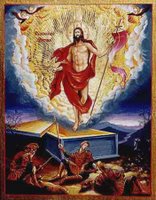
The message of Holy Week is timeless, challenging all who play the “New vs. Old” game to repent. Pastor Joe Fremer,
The Grateful Christian, shares
The Timeless Message with us.
In the middle of Weekend Fisher’s series on systematic theology, this is the cornerstone piece, the beginning of the writings on God’s grace. Be startled with her as she writes of
The Encounter with Christ.
Pastor Tom Chryst’s
Preachrblog provides thoughts
On Church Signs and what their messages should be.
Nerd Heaven takes us from the sublime —
History and Theology — to the saturated (fat) —
Doughnuts and Burgers Together. Learn why we
must know our past and then find a way to replace all those empty calories avoided during the Lenten fast. Back to the sublime again, Sam also has an excellent Lutheran evaluation of
Church Growth.
Dan at
Necessary Roughness shares his evaluation of his new
toy tool, a digital voice recorder, in
Sound Check. He also presents
Maundy Thursday at Good Shepherd, with notes and musings on Pastor Childs’ sermon.
Is it all about Michael Graves? No,
It’s an Ice Cream Scoop. In a humorous post,
David Yow tells a story about his new utensil, comparing advertising hype to the quality of the product. An amusingly odd, yet thoughtful, post on a subject you may never again consider.
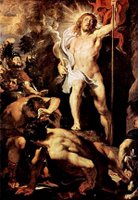 From Dust, From Dust
From Dust, From Dust — yes, you read that correctly. Not only do we return
to dust but the
Poor Miserable Sinner reminds us that because Jesus the New Adam rose
from the dust of the earth, so shall we.
At
Wretched of the Earth, Ryan ruminates on the Easter reality that God is hungry to gobble up some death in
Resurrection Day: Death Loses.
The
Confessing Evangelical asks us to consider, “Do anti-religious types have a false understanding of the
Poky Little Medieval Universe?”
In preparation for filling in for his Pastor the usual Confessions Study, Sean plans to talk about Lutheran worship, beginning with Christ and moving towards finding a proper name to call
The Christian Gathering. He also offers comments on an under-used but absolutely fantastic Easter hymn,
Christ Jesus Lay in Death’s Strong Bands.
Besides sniffing out new confessional Lutheran blog sites (so
that’s what that snout is good for!),
Aardvark Alley also gave us two more hagiographies,
Johannes Bugenhagen and
Saint Anselm of Canterbury.
There was only one new review at the
Luther Library during the past (busy) fortnight, but it’s a dandy. Dr. Veith introduces us to
Lars Walker: Lutheran Novelist.
Jeremy Abel of
Living Among Mysteries didn’t want to toot his own horn, although I recommend
The Words of the Wise Are Like Goads. He, instead, thought we should be reading
Lights Off in America, by Uwe Siemon-Netto at the Concordia Seminary
Institute of Lay Vocation blog. In a lecture at Concordia College in New York, Dr. Siemon-Netto warns us about the danger of continued dependence on oil. The United States, he says, has willingly placed itself in a position where “its very lifeblood is in the hands of its foes.”
He’s back! After an all-too-long hiatus, David gets us
Horn + Swoggled again with
Lutheran Businessman to Market “Spaceraments” — the story of a Lutheran astronaut inspires a new business venture to set outer space ablaze with the Spirit.
Bass Ackwardness and Confirming What? The
Random Thoughts of a Confessional Lutheran examine, ask, and answer the placement of relationship (between himself and
Elle) “cart and horse” issues and go on to say why Dan thinks Confirmation is worthless.
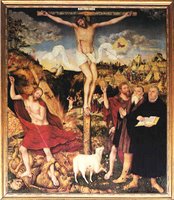 Kelly’s Blog
Kelly’s Blog provides the meditation
Good Friday, Linger at the Cross, noting that this is one of the best ways to truly appreciate Easter. She also shares her first picture in the Hebrews 11 series,
The “Finished” Picture of Abel. In this Easter season, note especially the wounded, standard-bearing lamb on the altar, assuring Abel of the hope of the resurrection.
Hoc est verum provides a layman’s reaction to the United Church of Christ’s new “inclusive” advertising campaign in
The UCC’s New Ad Spot. While Der Bettler submitted this one himself, others also suggested
Always Winter, Never Christmas, a thoughtful evaluation of a major theme of
The Lion, the Witch, and the Wardrobe, and his exposure of the lie that
Jesus Never Condemned Anyone.
The First British Lutheran Blog Ever remains one of the
better Lutheran blogs, British or otherwise, as Chris Williams shows when he writes
Grace Isn’t Fair, a reminder of the enormous, unmerited favor we find in the Father’s eyes for the sake of His Son.
Pastor Paul Beisel remains
One Lutheran ... Ablog™ and gives the insightful, sometimes disturbing evaluation
My Trip to St. Louis Seminary.
I beat the
Aardvark to this one! I just found
Living Like a Lutheran, a Lutheran mom and homeschooler. Her
“Rambo”lings seriously upbraid those who despise liturgical worship and exhorts pastors to be strong in resisting the siren calls of expediency and comparison to churches growing in number while shrinking from sound doctrine.
Finally, I guess that I should pick a couple of my own posts to wrap things up. Since Christ is the center of our theology, I offer an answer to the question
Jesus Lower than God? and to close on a Paschal theme, I recommend
Holy Week: The Passover of Our God.
 A: There are several things to consider in making a final decision. First of all, God wants men and women to have sex and children within the bounds of marriage. He desires that each child conceived be raised by married (Christian) parents. Second, if you have come together and “acted” like husband and wife, with the intention of always being together, you have already “married” each other. Ceremonies, whether religious or civil, are only ratifications of what the two have already promised to each other.
A: There are several things to consider in making a final decision. First of all, God wants men and women to have sex and children within the bounds of marriage. He desires that each child conceived be raised by married (Christian) parents. Second, if you have come together and “acted” like husband and wife, with the intention of always being together, you have already “married” each other. Ceremonies, whether religious or civil, are only ratifications of what the two have already promised to each other.
